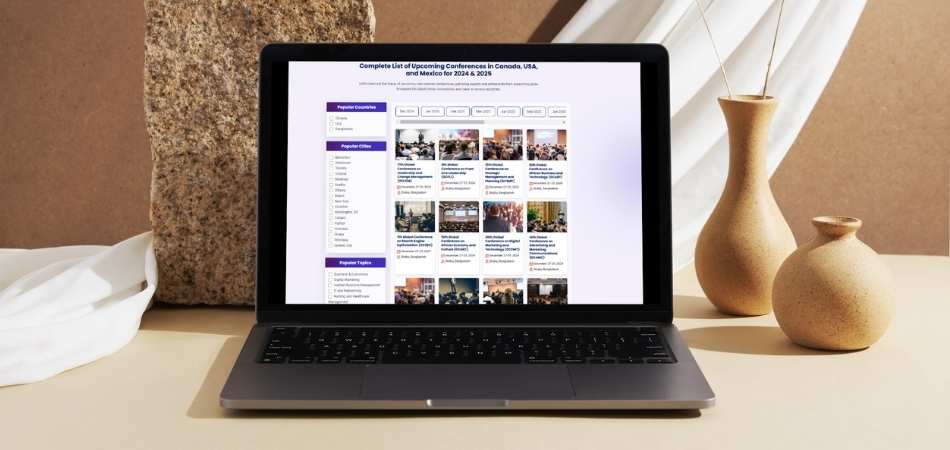Choosing the right conference from the wide range of options available requires a strategic approach adapted to your specific professional needs and interests. The process can be complex, but with a methodical approach, it becomes manageable. When it comes to “How can I find conferences in Canada that match my interests?” you’re not the only one asking that question.
To effectively pinpoint conferences that align with your interests, start by clearly defining your professional and personal development goals. Use these objectives as a filter to search through databases, networking groups, and industry publications that list upcoming events. Prioritize conferences that offer sessions and networking opportunities that can directly benefit your career growth or expand your knowledge base.
Are you curious about finding conferences in Canada that relate precisely to your field and interests? This article will guide you through various strategies and tools to discover and decide on conferences that will most benefit your professional journey.
Diverse Conference Culture in Canada
Canada is renowned for its rich and diverse conference culture, attracting professionals, academics, and enthusiasts from across the globe. The country’s multicultural ethos ensures a variety of perspectives at every event, making Canadian conferences notable. From advanced technology to sustainable development, Canada’s conferences cover a wide array of topics.

This diversity is reflected in the types of events held, which range from academic symposia to industry expos and cultural festivals. Cities like Toronto, Vancouver, and Montreal host some of the most prestigious gatherings, promoting innovation and collaboration. These conferences often serve as platforms to address global challenges while showcasing local expertise and creativity.
Canadian conferences are known for their inclusive approach, blending networking opportunities with thought-provoking discussions. Whether exploring industry-specific events or multidisciplinary gatherings, conferences in Canada provide exclusive value, their global reputation makes them a preferred choice for knowledge-sharing and professional growth.
How Can I Find Conferences in Canada That Match My Interests?
You can advance your career, network, and gain new insights by attending conferences that align with your professional or personal interests. Canada, with its vast array of conferences across multiple industries, offers many opportunities to engage with peers and experts in your field. Here’s how to pinpoint the events that best match your interests.
Determine Your Objectives and Interests
To gain the most benefit from attending a conference, you must clearly define your goals. Are you looking to gain specific knowledge, meet industry leaders, or present your own research? Knowing your goals will help you focus on finding events that serve specifically your professional needs and interests. Consider the fields you are most passionate about and any particular topics you wish to explore further.
Use Online Resources
There are numerous online tools and websites dedicated to listing and categorizing conferences. Platforms like Global Conference Alliance Inc. and Eventbrite provide extensive listings that can be filtered by location, topic, and date. These resources make it easy to scan for upcoming events and find specific conferences that align with your interests. Regularly checking these sites can keep you updated on the latest conference schedules.
Utilize Professional Networks
Your professional network can be a valuable resource in discovering relevant conferences. Connect with colleagues, mentors, and industry peers to learn about the conferences they have attended or plan to attend. LinkedIn, professional associations, and industry-specific groups often share announcements or reviews of various conferences, which can provide personal insights and recommendations.
Subscribe to Industry Newsletters
Many industry groups, academic institutions, and professional organizations offer newsletters that frequently include information about upcoming conferences. Subscribing to these can provide you with advance notice of events, often with detailed descriptions, so you can decide if they align with your interests. Newsletters are particularly useful for keeping your finger on the pulse of your industry without actively searching for opportunities.
Attend Virtual Webinars and Local Meetups
Before committing to larger conferences, participating in virtual webinars and local meetups can be a strategic move. These smaller or online gatherings can give you a taste of the topics and quality of discussions that might be expected at bigger conferences in Canada. They also offer additional networking opportunities that could lead to recommendations for other relevant events.
Check Academic and Trade Publications
Academic journals and trade publications related to your field of interest often advertise relevant conferences. These publications can also offer insights into which conferences are considered essential within your industry and might provide reviews or content from past events that can help you decide their value for your professional development.
Consider the Event’s Reputation and History
Research the history and reputation of the conferences that catch your interest. Established conferences with a long-standing presence typically offer more extensive networking opportunities and a proven track record of valuable content. Reading reviews and testimonials from past attendees can provide a clearer picture of the event’s benefits and atmosphere.
By following these strategies, you can locate events that not only match your interests but also offer significant opportunities for growth and networking. Remember, the right conference can provide a crucial platform for learning, sharing, and connecting with others who share your passions and professional ambitions.
What Factors Should You Consider When Selecting a Conference?
Professional development and networking success can be significantly influenced by attending the right conference. You should carefully consider several factors that contribute to the value of a conference before attending, regardless of whether you’re looking to expand your knowledge, present your work, or connect with peers. Here’s what you need to consider ensuring that the conference you choose aligns perfectly with your objectives.
Relevance to Professional Goals
Consider how the conference topics align with your current projects or long-term career objectives. A relevant conference will offer sessions that broaden your knowledge and apply directly to your area of expertise or interest. It should provide actionable insights that you can implement in your work or that stimulate further research and inquiry.
Quality of Speakers and Content
The caliber of speakers is a direct indicator of the conference’s quality. Look for events featuring leaders and innovators in your field whose presence can guarantee deep insights and high-quality discussions. Review the agenda for a variety of content forms, such as workshops, keynotes, and panels, which suggest a well-rounded event serving diverse learning preferences.
Networking Opportunities
A major benefit of attending conferences is the opportunity to network. Check if the conference facilitates networking through events like meet-and-greets, breakout sessions, and social activities. These are valuable for establishing new contacts and strengthening existing relationships within your industry. Also, consider the typical audience size and the sectors or industries represented, as this will affect the networking dynamics.
Location and Accessibility
The geographic location of the conference can significantly impact your decision. Assess the travel requirements, accommodation options, and the overall accessibility of the venue. Additionally, attending a conference in a city or country that is a hub for your industry can provide further professional opportunities beyond the event itself.
Cost and Value for Investment
Consider the cost of registration, travel, accommodations, and any other expenses against the potential benefits you aim to gain. A higher-priced conference might offer greater value in terms of excellent speakers, strategic insights, and networking opportunities that are not available at less expensive venues. Early bird registration options, group rates, or membership discounts can also provide cost savings.
Past Attendee Reviews
Look for feedback from previous attendees to gauge their experiences regarding the organization, content quality, and networking opportunities of the conference. Positive reviews can reassure you of the conference’s potential benefits, while negative feedback can steer you toward better alternatives.
Cultural Considerations
When selecting a conference in Canada, think about the cultural considerations for attending a conference in Canada, such as the diversity of the audience and the inclusion of various cultural perspectives in the conference agenda. This can enrich your experience, providing a broader perception of how your field of work is approached in different cultural contexts.
What Role Do Academic Institutions Play in Hosting Canadian Conferences?
Academic institutions are crucial to the development of Canadian conferences, providing a foundation for knowledge exchange, professional networking, and research promotion. These institutions not only serve as venues, but also as organizers and catalysts for scholarly and professional conferences that span a wide range of disciplines. Here’s how universities and colleges contribute to the success and richness of conferences in Canada.
Facilitating Knowledge Exchange and Research Dissemination
Academic institutions are natural hosts for conferences as they are centers for learning and research. They provide a platform where academics, students, and professionals can share the latest research findings and theoretical advancements. Conferences hosted at these venues often feature presentations of recent research, panel discussions on academic topics, and workshops designed to delve deeper into complex subjects, upbringing a rich environment for knowledge dissemination.
Providing Resources and Infrastructure
Universities and colleges offer essential resources and infrastructure important for the successful execution of conferences. This includes access to lecture halls equipped with advanced audio-visual technology, breakout rooms for smaller discussions, and large auditoriums for keynote speeches. The availability of these facilities makes academic institutions ideal for accommodating large groups of attendees and facilitating a variety of conference activities.
Enhancing Educational Opportunities
Conferences hosted by academic institutions often provide excellent educational opportunities for students and faculty alike. These events allow attendees to engage with experts and thought leaders from around the world, offering a broader perspective that refines classroom learning. Furthermore, students can gain invaluable experience by participating in these professional settings, often contributing as volunteers or presenters.
Offering Professional Development Credits
Many academic conferences in Canada are structured to provide professional development credits, which are essential for attendees looking to maintain or advance their professional certifications. These professional development credits at conferences in Canada serve as a key draw for professionals who need to meet continuing education requirements within their fields, adding significant value to the overall conference experience.
Tips for Networking to Learn About Upcoming Conferences
Networking is a powerful tool for staying informed about upcoming conferences that can benefit your career. Utilizing your connections effectively can open doors to opportunities and exclusive information that might not be readily available through public channels. Here are some practical tips to improve your networking efforts.
- Engage with Professional Associations: Professional groups and associations are often the first to know about industry-specific conferences. Joining such organizations and actively participating in their meetings can provide early alerts on upcoming events.
- Utilize Social Media Platforms: Follow conference organizers, industry leaders, and relevant hashtags on platforms like LinkedIn and Twitter. Social media can offer real-time updates and insider information on conference planning and speaker lineups.
- Attend Local Meetups and Seminars: Regularly attending local events increases your chances of meeting people who share similar professional interests. These gatherings can be a goldmine for learning about not-yet-published conferences.
- Connect with Speakers and Presenters: Establish connections with past conference speakers and presenters. These individuals are likely involved in the conference circuit and can provide personal recommendations on worthwhile events.
- Use Alumni Networks: Your alma mater’s alumni network can be a valuable resource for information on conferences. Alumni often share opportunities such as conferences and workshops that could benefit current students and fellow graduates.
- Subscribe to Newsletters: Sign up for newsletters from organizations and thought leaders in your field. These can be rich sources of information, often announcing or sponsoring upcoming conferences.
- Ask Directly in Your Network: Don’t hesitate to ask your peers, mentors, or colleagues about upcoming conferences during conversations. A direct question can sometimes yield the most straightforward answers.
Frequently Asked Questions (FAQs)
Exploring and selecting the right conferences can open doors to new knowledge and networks. Below, find answers to some common questions about identifying and choosing conferences in Canada that align perfectly with your professional and personal aspirations.
What Are the Best Strategies for Finding Conferences That Match My Interests in Canada?
Find events that match your core interests and professional goals by searching online conference directories, industry websites, and professional networking sites like LinkedIn. Subscribing to newsletters from relevant organizations can also provide regular updates on upcoming events.
How Can I Use Social Media to Find Relevant Conferences in Canada?
Social media platforms are excellent for real-time updates on conferences. Follow industry leaders, relevant organizations, and professional groups on platforms like Twitter and LinkedIn. Engaging in industry-specific groups can provide advance notice of upcoming events and insider information from previous attendees.
Can Joining Professional Associations Help Me Find Conferences in Canada?
Yes, joining professional associations is highly beneficial. These associations often have firsthand information on industry-specific conferences and events. They provide members with resources, including exclusive invites or discounts for conferences, which can be invaluable for networking and professional development.
How Do Academic Journals and Publications Help in Finding Conferences?
Many academic journals and trade publications feature advertisements and announcements for upcoming conferences. They also review past conferences, providing insights into their relevance and success, which can help gauge the potential value of future events in similar domains.
What Should I Consider When Selecting a Conference to Ensure It Matches My Interests?
Consider the conference’s focus, the quality of speakers, the topics covered, and the professional development opportunities it offers. It’s also wise to evaluate past attendee reviews to understand the conference’s reputation and the quality of networking it facilitates.
Final Thought
Finding the right conferences can be invaluable for your professional growth and networking potential. By utilizing tools like online directories, industry newsletters, and professional networks, you can identify events fitted to your goals. With these strategies, the answer to how can I find conferences in Canada that match my interests becomes clear: focus on your objectives, use the right resources, and choose events that align with your aspirations.
As you explore a wide range of Canadian conferences, remember to stay proactive by subscribing to updates and engaging with your network regularly. Approach each opportunity with clear goals, and don’t forget to reflect on the outcomes for continuous improvement. Wishing you success as you explore conferences that advance your career and knowledge!







